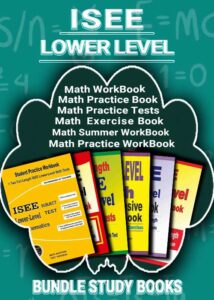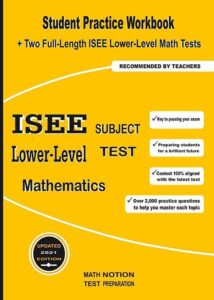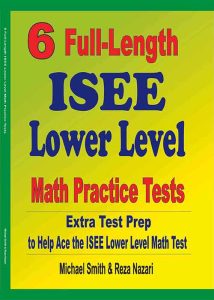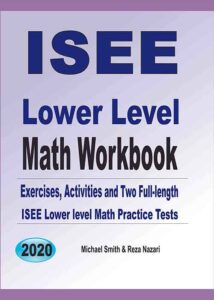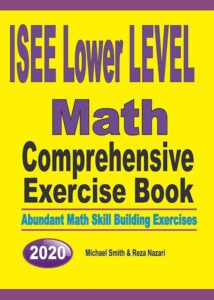
Study Time: 4minutes
How to Prepare for the ISEE Lower Level Math Test: Study Tips & Tricks
The Independent School Entrance Examination (ISEE) Lower Level Math Test can be a significant step for younger students aiming to attend competitive private schools. Preparing for this test can be challenging, but students can excel and gain the confidence they need with the right strategies and resources. This article outlines essential study tips and tricks to help students prepare effectively for the ISEE Lower Level Math Test.
Understanding the ISEE Lower-Level Math Test
Before diving into preparation, it’s crucial to understand the structure and content of the ISEE Lower Level Math Test. This test is designed for students in grades 4 and 5 and assesses their mathematical skills through various questions. The test typically includes arithmetic, introductory algebra, geometry, and data analysis sections.
The test format consists of multiple-choice questions, and students must select the best answer from the provided options. Familiarity with the test format and types of questions can significantly reduce anxiety and improve performance on test day.
Creating a Study Plan
A well-structured study plan is the foundation of practical test preparation. Start by assessing the time available before the test date and divide it into manageable study sessions. Consistent, shorter study periods are more effective than cramming all the information in one go.
Set specific goals for each study session, focusing on different math topics. Allocate more time to areas where the student needs the most improvement, but don’t neglect the topics they are already comfortable with. Regularly reviewing all topics ensures a well-rounded preparation.
Utilizing Quality Study Materials
Using high-quality study materials is essential for effective preparation. Look for reputable ISEE Lower Level Math practice books, online resources, and sample tests. These materials provide practice questions similar to those on the actual test, helping students become familiar with the question format and difficulty level.
Interactive online platforms can be beneficial, as they often include adaptive learning technologies that tailor the difficulty of questions based on the student’s performance. This personalized approach ensures that students are continually challenged and making progress.
Mastering Fundamental Math Concepts
A strong grasp of fundamental math concepts is crucial for success on the ISEE Lower Level Math Test. Focus on core topics such as addition, subtraction, multiplication, division, fractions, decimals, percentages, basic algebra, and geometry. Ensure the student understands these concepts thoroughly and can apply them in different contexts.
Practice problems that require multi-step solutions to develop the student’s problem-solving skills. Encourage them to explain their thought process and reasoning, as this reinforces their understanding and helps identify any areas of confusion.
Practicing with Sample Tests
Taking full-length practice tests is one of the most effective ways to prepare for the ISEE Lower Level Math Test. These tests simulate the actual test environment, helping students become accustomed to the timing and pressure of the exam. Practice tests also provide valuable insights into the student’s strengths and weaknesses.
Review the answers together after completing a practice test and discuss any mistakes. Understanding why an answer was incorrect is just as important as knowing the correct answer. This review process helps identify patterns of errors and areas that need more focus.
Developing Test-Taking Strategies
In addition to mastering math concepts, developing effective test-taking strategies can significantly improve performance. Teach students how to manage their time during the test, ensuring they allocate enough time to each question and don’t get stuck on particularly challenging ones.
Encourage students to read each question carefully and underline key information. For multiple-choice questions, they should eliminate incorrect answers to increase their chances of selecting the correct one. If they’re unsure about an answer, it’s often better to make an educated guess rather than leaving it blank, as there is no penalty for guessing on the ISEE.
Building Confidence and Reducing Anxiety
Confidence plays a critical role in test performance. Help students build confidence by celebrating their progress and achievements throughout the preparation process. Remind them that it’s normal to feel nervous before a test, but thorough preparation can significantly reduce anxiety.
Teach relaxation techniques such as deep breathing exercises and positive visualization to help manage stress. Encourage a healthy routine with adequate sleep, nutritious meals, and physical activity, as overall well-being contributes to better focus and performance.
Seeking Additional Help if Needed
If the student struggles with specific math concepts or test strategies, consider seeking additional help. Tutors, online courses, and study groups can provide personalized guidance and support. Sometimes, a different perspective or teaching method can significantly affect understanding and retention.
Engaging in Fun Math Activities
To keep the preparation process enjoyable and engaging, incorporate fun math activities into the study routine. Games, puzzles, and real-life math applications can make learning more interactive and less monotonous. These activities also help reinforce math skills in a practical and enjoyable manner.
Utilizing Technology and Apps
Numerous educational apps and online platforms are designed to help students prepare for standardized tests like the ISEE. These tools often include practice questions, instructional videos, and interactive exercises that make learning more engaging and accessible.
Choose apps that offer personalized learning experiences, track progress, and provide feedback. This technological approach can supplement traditional study methods and keep students motivated.
Encouraging a Growth Mindset
Instilling a growth mindset in students is essential for long-term success. Emphasize the importance of effort and persistence rather than innate ability. Encourage students to view challenges as opportunities to learn and grow and praise their hard work and resilience.
A growth mindset helps students stay motivated and positive, even when encountering complex problems or setbacks. It fosters a love for learning and a willingness to tackle new challenges confidently.
Conclusion
Preparing for the ISEE Lower Level Math Test requires understanding the test structure, mastering fundamental math concepts, practicing with sample tests, and developing effective test-taking strategies. Students can approach the test with a positive mindset and the skills needed to succeed by creating a structured study plan, utilizing quality resources, and building confidence. Students can excel on the ISEE Lower Level Math Test and achieve their academic goals with dedication, practice, and support.
Frequently Asked Questions
What is the format of the ISEE Lower Level Math Test?
The ISEE Lower Level Math Test consists of multiple-choice questions covering arithmetic, basic algebra, geometry, and data analysis. It is designed for students in grades 4 and 5.
How can I create an effective ISEE Lower Level Math Test study plan?
Start by assessing the time available before the test and divide it into manageable study sessions. Set specific goals for each session, focus on different math topics, and allocate more time to areas needing improvement.
What are some effective test-taking strategies for the ISEE Lower Level Math Test?
Manage your time well, read each question carefully, eliminate incorrect answers, and make educated guesses if unsure. Practice with full-length tests to become accustomed to the test environment.
How can I reduce anxiety before the ISEE Lower Level Math Test?
Build confidence through thorough preparation, celebrate progress, practice relaxation techniques, and maintain a healthy routine with adequate sleep, nutritious meals, and physical activity.
What resources can help with ISEE Lower Level Math Test preparation?
Use reputable practice books, online resources, sample tests, educational apps, and interactive online platforms. Consider seeking additional help from tutors or study groups if needed.
How can I make math study more engaging for my child?
Incorporate fun math activities like games, puzzles, and real-life applications. Use educational apps and online platforms to make learning interactive and enjoyable. Encourage a growth mindset and praise effort and persistence.


